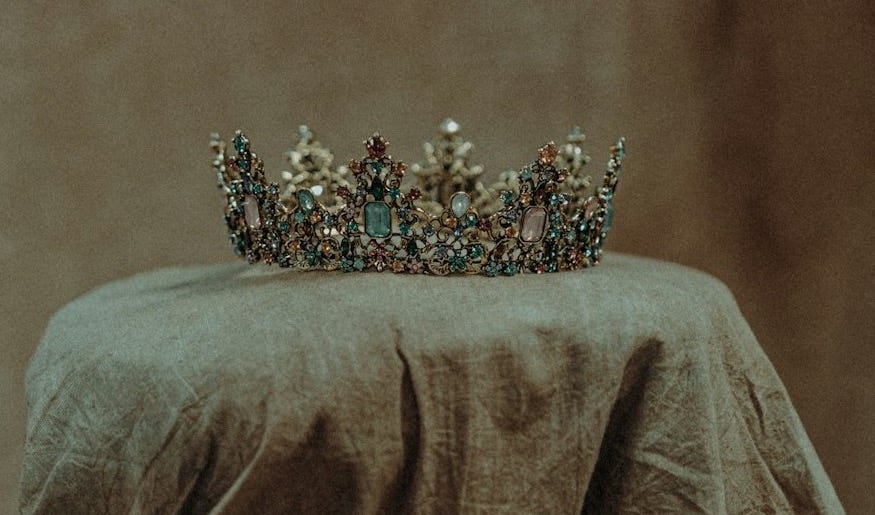Anchor
One thing have I asked of the Lord, that I will seek after: that I may dwell in the house of the LORD all the days of my life, to gaze upon the beauty of the LORD and to meditate in his temple.” — Psalm 27:4
Sea
What can I say about beauty?
Is it frivolous, as the art world proposes? Oppressive and burdensome, as some feminists would say? Expected and yet never sufficient to appease society’s demands? Lusted after then despised as the affections of men often sneer?
No. I’m convinced of the need for beauty. Beauty is a gateway to contentment. When something is beautiful, you desire to gaze at it. As you look, awe and wonder begin to well up inside you. Beauty begins to work on you.
A few weeks ago, I felt awe walking into Maria della Salute Basilica in Venice. Massive marble sculptures, delicate and enduring, laced the main altar. A train of carnelian velvet billowed from the golden crown above the gold-leaf icon of a dark-skinned Madonna. Chequed floors of alternating stones. Vivaldi was playing on the organ and a cloud of witnesses ambulated beneath the light-encrusted dome. I wept for wonder. I thought, all this beauty! And it won’t even hold a candle to the throneroom of God.
Wonder is the natural state of the believer enraptured with their awe-inspiring God. So what if we treated God as the great beauty S(he) is? Better yet. What if God is BEAUTY itself?
Our focus would dramatically shift from what we need to do for God (or what God isn’t doing for us) towards delighting in Her exquisite presence. If we take God as Beauty itself, that would mean we could be completely satisfied in the act of admiration. We don’t need God to accomplish any petition or demand, no pesky little favor on our behalf, because S(he) is Awesome and awe is enough for us.
Can you imagine a being so splendid in form, impeccable in character, and gracious in essence that we are stunned into the kind of totalizing wonder that banishes all self-consciousness, a Being whose presence alone plugs the holes in us left from trauma, injustice, foolishness, and sin, whose Face makes us whole?
When the Bible talks about glory, this word can and should be translated as beauty many times. Try reading these verses aloud with the translation of beauty in place of glory.
“The sun shall be no more your light by day, nor for brightness shall the moon give you light, but the LORD will be your everlasting light, and your God will be your beauty.” — Isaiah 60:19
“In that day the LORD of hosts will be a crown of glory, and a diadem of beauty, to the remnant of his people.” —Isaiah 28:5
The Jewish tradition often refers to the manifest glory of God or the presence of God that dwelled in the temple as the Shekhinah. The Shekhinah is simultaneously luminous and yet also appeared as a cloud so that the Overshadowing Radiance of God was veiled from the people. This Shekinah is a feminine word. It can be understood as the Abiding Glory and the Beautiful Presence.
The LORD is called beautiful, not handsome, for a reason. Beauty has an undoubtedly feminine connotation in English. Glory is often used in more masculine contexts, an old word belonging to kings and emperors, a kind of power and stature frequently denied to women.
Conversely, beauty is less commonly associated with power and more closely aligned with grace. Beauty is an inner balance that inspires awe, not via force but through desire. Beauty is enchanting; the mere revelation of it inspires joy.
I am not saying that God is not mighty—of course, S(he) is, but S(he) is also radiant. And I fear this latter aspect has gone under-celebrated in our lives as believers.
While only emphasizing the power and utility of God, I have tried to bully people into worship, guilt people into prayer, and manipulate people into reading the Bible. When I do this, I forget the unrelenting beauty of the God I serve. I have forgotten that God is attractive. I don’t need to convince people. It’s impossible not to see if they look.
God is attractive.
A husband studies his bride after years of a good marriage; what does he see? Does he only see wrinkles? No. He sees how youthful joy has deepened into sensual wisdom, how charm has given way to grace. Look at what the lover says about his girl in Song of Solomon: “Who is this who looks down, confident as the dawn, beautiful as the moon, radiant as the sun, awesome as an army with banners?” Confident, beautiful, radiant, glorious!

Fun Fact: the way the LORD describes Herself as a crown upon the head of the people in Isaiah 28:5 is the same way that Proverbs 12:$ describes an excellent wife as a crown of her husband. A woman of noble character deserves praise, says Proverbs 31. But like a cold man who has been married to a loving wife for decades, I had grown insensitive to God’s beauty, too busy and demanding to sit and admire Her grace. In Venice, I was again alive to it. Beauty reminded me of Beauty.
What beauty—whose beauty—have you grown blind to but now suddenly comes to mind? That radiance is meant to refresh you. Seek its wisdom.
What comes to mind for me is the December quiet of the still dark mornings. I wake up in the womb of the day before the labor of dawn. There, I feel the possibility of everything swirling around me but not yet formed. I find the presence of God there, with Her beauty veiled, inviting me to come cozy up on the couch. Anticipation begins to stir:
“O my dove, in the clefts of the rock, hidden in the crannies of the cliff, let me see your face, let me hear your voice, for your voice is sweet, and your face is beautiful to look at.” Song of Solomon 2:14. I don’t know if it’s me speaking to the Lord or the Lord speaking to me, but I feel our oneness. And in the beauty of our union, I am satisfied.
Verily,
Alysia
Sail
Below is Derek Walcott’s poem about Venice that I read serendipitously while in Venice. It directed me to search for the church mentioned therein, Santa Maria della Salute. I arrived just in time for mass conducted by a Black priest in front of a Black Madonna. This poem is dear to me because it led me to wonder and delight. Just another little example of when poetry, love, and the Spirit—my three great inspirations—seamlessly intertwine. [I added stanza breaks to his poem to make the poem easier to digest.]
28
The gulls settle like standards on the piles while plumming waves march past them in their legions, in the accommodating light, the crescent miles of Rodney Bay, memory revisits two regions: one, liquid Venice, then the indigo weight of solid Stockholm. In both a cherub smiles at gurgitating, lion-headed fountains, their basins bright with chattering water, repetitious questions; one region consonantal obdurate, the other vowelled. I pay both allegiance and gratitude, for light's net that would dance on the room's walls, the wires, poles, and the freight of bobbing gondolas and the unknown domes of palaces and chapels, Santa Maria della Salute and, in a summer sun, traffic like Stockholm's white ferries, blinding, bound for the islands. On a day like this, all blaze with the same beauty.















Share this post